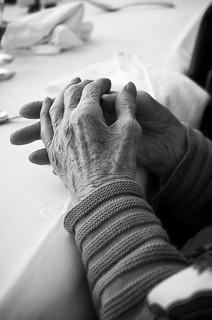Nursing home abuse is a terrible crime that preys on the very people whom society should most respect. Abuse in senior care facilities can take a range of forms including physical, sexual, emotional, and financial mistreatment as well as neglect. Often, abuse is perpetrated by overworked staff members and the law typically holds both the individual abuser and his/her employer criminally and civilly responsible. There is, however, a less talked about scenario – resident-on-resident nursing home abuse, also known as peer abuse Our experienced Northern California nursing home abuse law firm believes that care centers should be held liable when their negligence or failure to provide adequate care allows one resident to abuse another.
Resident Dispute Ends With Stabbing at Sacramento Senior Care Facility
A case of peer abuse is believed to have left a 75 year-old woman with serious injuries according to an article in Monday’s Oakland Tribune. Police believe that 70 year-old Barbara Holland had an ongoing dispute with her neighbor at St. Francis Manor, a senior living facility in Sacramento. According to investigators, Holland arrived at her neighbor’s door last Saturday armed with a knife and stabbed the 75 year-old before fleeing the scene. Eventually, Holland was found in her own apartment, arrested, and booked on suspicion of attempted murder. Doctors say the 75 year-old, who was taken to an area hospital, is expected to survive.
 Study Finds Peer Abuse Impacts Nearly 20% of Nursing Home Residents
Study Finds Peer Abuse Impacts Nearly 20% of Nursing Home Residents
Weil Cornell Medical College recently released a study focused on the growing threat of aggressive encounters between nursing home residents. Researchers found that nearly one out of every five (19.8%) nursing home residents experienced at least one negative, aggressive encounter with another resident (or multiple residents) in the previous four weeks alone. These encounters, termed resident-to-resident elder mistreatment, included verbal, physical, and sexual interactions as well as invasion of privacy. The study is the first attempt to study the prevalence of mistreatment of one resident by another using interviews and observation.
Researchers noted that the problem is under-reported and urged the need for effective intervention. Most of the perpetrators suffered some form of cognitive disability, including dementia, but were physically able to move throughout the facility. The study authors recommended facilities train staff to recognize and report peer mistreatment and issue guidelines for addressing incidents of resident-to-resident aggression.
Holding Nursing Facilities Responsible for Peer Abuse
The backbone of California’s elder abuse law is the “Elder Abuse and Dependent Adult Civil Protection Act” (“EADACPA” or “the Act”). The Act defines abuse broadly including both affirmative acts of abuse as well as neglect that leads to physical harm or mental suffering. Under the EADACPA, negligence amounts to the “failure of any person having the care or custody of an elder or a dependent adult to exercise that degree of care that a reasonable person in a like position would exercise.”
Given the prevalence of peer abuse and the well-known tendency of some dementia patients to act out in a way that may harm others, failing to protect patients from resident-on-resident abuse is likely to constitute negligence. Inadequate staffing can be a key factor in these cases. In California, a patient who experiences an assault by a fellow resident or another form of resident-to-resident mistreatment may have a civil claim against the nursing center.
The Brod Firm is dedicated to helping victims of nursing home abuse recover appropriate damages and escape from an abusive situation. If you, your parent, or another close relative has experienced peer abuse in a nursing home or other senior care facility, please call our firm. With nursing home abuse law offices in Santa Rosa, Oakland, and San Francisco, we are committed to a safe living environment for all of Northern California’s seniors.
See Related Blog Posts:
Despite Legislation and Regulation, Elder Abuse Remains a Major Problem in California
Understanding Senior Care & Preventing Elder Abuse
(Image by Jonas Boni)
 San Francisco Injury Lawyer Blog
San Francisco Injury Lawyer Blog

